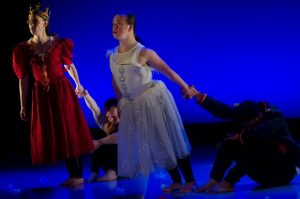Tracey Harding gives a round-up of the highlights and things to watch out for in the world of performance
Arts pioneers with learning disabilities are continuing to forge successful paths.
A taboo-breaking film continues to receive critical claim, Hollyoaks employs its first autistic actor and an underground performance has been showing some disturbing truths. Looking ahead, the First World War is to be interpreted in dance.
Enjoy some Sanctuary!
One of the films discussed in the previous issue of Community Living -Sanctuary by Len Collins – continues to be shown in film festivals around the world and garner praise and positive reviews.
This groundbreaking story of a couple’s overnight stay in a hotel helped to change the law in Ireland that made sex between learning disabled adults illegal.
The film is now more easily available for us all to enjoy as it has been released on digital formats. It can be found in the Sky Store, iTunes and Amazon so, if you haven’t managed to catch it yet, there really is no excuse.
Access All Areas: Madhouse Re: Exit and a new direction for Hollyoaks
An excellent theatre performance by a company of learning disabled and autistic actors is causing quite a stir.
Access all Areas production Madhouse Re: Exit enjoyed a sold-out run at Shoreditch Town Hall in London in March, before moving to Manchester as part of The Lowry’s Week 53 Festival in May.
It is reviewed in this issue by Sean Kelly (page 18) and discussed by Jan Walmsley (page 27).
The production is based on the story of Mabel Cooper, a resident of a long-stay hospital for people with learning disabilities who campaigned against these institutions. Five learning disabled actors stage an immersive underground journey, including audience participation, to portray the reality of what it feels like to be learning disabled in today’s society.
In an interview for The Stage, one of the performers – Cian Binchy, the autism consultant of the National Theatre’s The Curious Incident of the Dog in the Night-Time – spoke about the difficulties faced by actors with learning disabilities.
“The biggest challenge I face is that people with learning disabilities just aren’t seen as eligible to perform in theatres …. people with learning disabilities aren’t listened to …. We’re not given the opportunities. ”
“I first got involved professionally four years ago through Access All Areas’ performance-making diploma at the Royal Central School of Speech and Drama.”
The company, based in East London, offers innovative projects for people with a broad range of learning disabilities providing training in the arts. It also offers consultancy and training to organisations and employers, and has been an innovator in setting up the performance making diploma for learning disabled adults at the Royal Central School of Speech and Drama.
Soap’s new story
Access all Areas has also assisted with a groundbreaking first – it was involved in auditioning and casting for Channel 4 show Hollyoaks. It will be the first UK soap opera to feature a character with autism.
Talia Grant will be the first autistic woman to land a mainstream role on British TV. She was one of more than 150 applicants who auditioned for the role of school student Brooke Hathaway. Her character will feature in episodes from June onwards.
In addition to raising awareness of autism, it is encouraging to see TV script writers featuring autistic characters.
Magpie Dance
Magpie Dance, a company for people with learning disabilities is joining forces with Dr Lee Humber from Ruskin College, Oxford to research the effects of the First World War on people with learning disabilities.
The company, which is based in Bromley, Kent, aims to explore this history through dance.
Magpie says that research to date shows that, of the 40,000 people with learning disabilities housed in asylums across the country in the 20th century, up to 12,000 were displaced when the buildings were requisitioned as war hospitals. This led to overcrowding, insufficient staffing and consequently a disproportionately high mortality rate.
The partnership sounds like an amazing opportunity for a little-known part of learning disability history to be explored and presented to a wider audience. Fingers crossed for more great things in the future.

